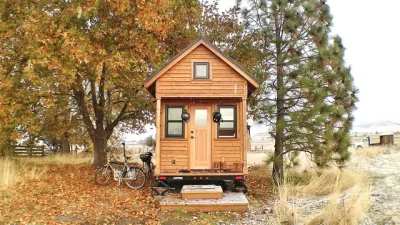Bill Rees, creator of the ecological footprint concept, warns that economic growth needs to slow down greatly if we want to maintain a civilized life on Earth.
"Bill Rees has consumer ennui."
"It isn't fair of me, really, to drop the good professor into this sprawling big-box store like a mouse in a maze. After all, he's not what you might call a retail-therapy kind of guy. In fact, few individuals on the planet have a richer understanding of precisely how $18.99 stewpots-because of the resources they consume in production and the waste they produce in their eventual disposal-are leading us toward a societal collapse. Rees has not only done the math on the true cost of our insatiable consumer appetites, he actually wrote the formula and came up with a simple metaphor-the ecological footprint-in an effort to get it through our thick skulls."
"Unfortunately, Rees's most recent finding-that humanity may be inherently unsustainable, the theme of his upcoming book-isn't earning him many friends in high places. Neither are his recommendations. In effect, he says, we need to do away with all the shopping, yesterday, and pull the emergency brake on runaway economic growth. And if we don't? 'We will trigger or disrupt something on a scale never before imagined, and take the whole system down,' he says matter-of-factly. 'It may not be the end of life on Earth, but it will make it very difficult to have civilized life.'"
"While the underlying science may be sound, these are not terribly marketable ideas. Stop growth? What are you, nuts? Yet deep down, at least a few of our policymakers and business leaders may believe Rees is correct. That said, the required whole-system changes are so profoundly unsellable that they pretty much never hit the ground."
FULL STORY: Rees's Thesis

Alabama: Trump Terminates Settlements for Black Communities Harmed By Raw Sewage
Trump deemed the landmark civil rights agreement “illegal DEI and environmental justice policy.”

Study: Maui’s Plan to Convert Vacation Rentals to Long-Term Housing Could Cause Nearly $1 Billion Economic Loss
The plan would reduce visitor accommodation by 25% resulting in 1,900 jobs lost.

Planetizen Federal Action Tracker
A weekly monitor of how Trump’s orders and actions are impacting planners and planning in America.

Waymo Gets Permission to Map SF’s Market Street
If allowed to operate on the traffic-restricted street, Waymo’s autonomous taxis would have a leg up over ride-hailing competitors — and counter the city’s efforts to grow bike and pedestrian on the thoroughfare.

Parklet Symposium Highlights the Success of Shared Spaces
Parklets got a boost during the Covid-19 pandemic, when the concept was translated to outdoor dining programs that offered restaurants a lifeline during the shutdown.

Federal Homelessness Agency Places Entire Staff on Leave
The U.S. Interagency Council on Homelessness is the only federal agency dedicated to preventing and ending homelessness.
Urban Design for Planners 1: Software Tools
This six-course series explores essential urban design concepts using open source software and equips planners with the tools they need to participate fully in the urban design process.
Planning for Universal Design
Learn the tools for implementing Universal Design in planning regulations.
Caltrans
Smith Gee Studio
Institute for Housing and Urban Development Studies (IHS)
City of Grandview
Harvard GSD Executive Education
Toledo-Lucas County Plan Commissions
Salt Lake City
NYU Wagner Graduate School of Public Service




























